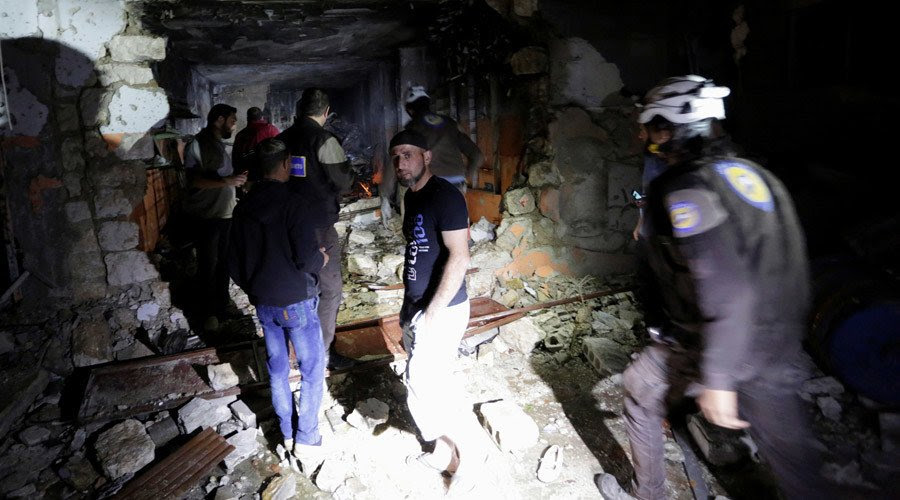Washington has asked Moscow not to conduct airstrikes against al-Nusra Front, which is Al-Qaeda’s branch in Syria, for fear that members of the “moderate opposition” could also be hit, Russian Foreign Minister Sergey Lavrov has reported.
“They [the US] are telling us not to hit it [al-Nusra Front], because there are also ‘normal’ opposition groups [on those territories],” Lavrov said in an interview with local Russian media that was published on the Russian Foreign Ministry’s website.
The minister also stressed that “such opposition groups should leave terrorist positions,” adding that “we have long agreed on that.” Russia first set a deadline for the “moderate” opposition to leave territories occupied by al-Nusra Front extremists, but then agreed to give them more time to withdraw.
In the interview, Lavrov said that Russia believes that taking specific and more effective measures to fight the Islamic State (IS, former ISIS/ISIL) and al-Nusra Front terrorist groups should be the top priority for Russia and the US if the Syrian crisis is to be resolved.
“It is important to provide humanitarian access to the settlements blocked by one side or another, to secure the ceasefire and to prevent its violation, as well as to launch the political process… but, as important as these goals are, terrorism is our common threat, and there should be no doubt about that,” he said, adding that, in the meantime, al-Nusra Front has been attempting to merge with other armed opposition groups.
Lavrov also said that the political process in Syria is being held back by radical opposition groups that refuse to come to the negotiating table and set preconditions for peace talks. He added that it is important to set aside these demands and focus on the fight against terrorism.
The minister also emphasized that Russia and the US are involved in a close and intensive dialog on Syria that includes regular telephone calls between Lavrov and his US counterpart, John Kerry, and a video-conference channel set up between the Russian Center for Reconciliation in Syria located at the Khmeimim airbase in Latakia and the US base in the Jordanian capital of Amman, as well as a joint US-Russian center in Geneva.
Lavrov had held a telephone conversation with US Secretary of State John Kerry at the initiative of the US side earlier the same day, the Russian Foreign Ministry said in a statement.
The two ministers discussed “the fight against ISIS and the need to urgently distance the moderate opposition from the Jabhat al-Nusra group, as well as efforts to cut off the flow of weapons and militants coming from abroad to beef up terrorist organizations,” the statement said.
In the meantime, Kerry, who is in Paris, told journalists that he had discussed the upsurge in violence in Syria during the phone call with Lavrov, explaining that the two had worked specifically on “ways to try to strengthen the enforcement and accountability for this cessation,” AP reported.
In the meantime, the US State Department said that Washington has asked Russia to be “more careful” in targeting its airstrikes against al-Nusra Front, as hitting civilians or opposition groups while attacking the jihadists could eventually give more support to the terrorist groups.
“[The US State] Secretary conveyed to Russia and the Assad regime that they need to carefully distinguish between these terrorist groups operating on the ground and those parties to the cessation of hostilities,” US State Department Deputy Spokesman Mark Toner said during a briefing on Friday, adding that the US agrees that IS and al-Nusra Front “pose a real threat to the security on the ground in Syria.”
‘US trying to play both sides to continue Syrian conflict’
Geopolitical analyst Patrick Henningsen told RT he believes Washington is not doing enough to convince so-called “moderate” rebel groups to part ways with terrorists.
By designating militants who share the same areas and positions with terrorists as “moderate opposition,” the US is actually providing the terrorists with a safe haven, Henningsen reasoned. The terrorist groups are profiting from such neighborly relations the same way they make use of civilians.
“The classification of moderate rebels is a type of the human shield,” he said.
Hennigsen claims that the lack of a clear signal to the rebel groups coming from Washington is the result of a deliberate strategic choice made by the US government, which wants the military conflict to drag on.
“All this talk of co-mingling, this is all double-speak,” he noted, adding that Washington is “trying to play both sides this to continue this conflict” and has no intention of actually resolving the issue.



No comments:
Post a Comment